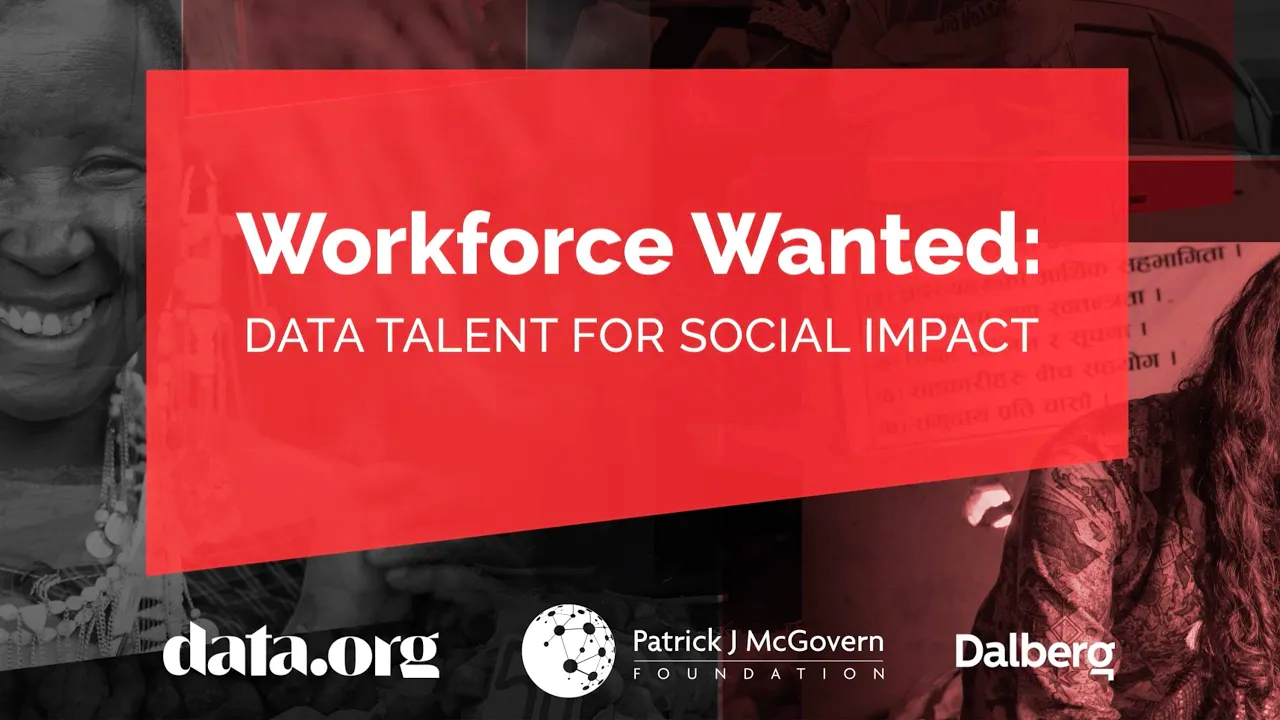License and Republishing
data.org reports may be republished in accordance with our Terms and Conditions.
Overview
data.org, the Patrick J. McGovern Foundation (PJMF), and Dalberg believe in a future in which people everywhere can use data to solve society’s greatest challenges and improve lives around the globe. But to realize this potential, building the next generation of diverse data talent for social impact is essential.
Workforce Wanted: Data Talent for Social Impact is a first-of-its-kind report on global data talent in the social sector. Confronting systemic challenges and highlighting both immediate and big-picture opportunities, this report delivers the current landscape and reveals four pathways forward for building purpose-driven data professionals. With the values of inclusivity, diversity, equity, and accessibility (IDEA) core to this work, Workforce Wanted identifies an opportunity to shape and support a pool of 3.5 million data professionals focused on social impact in low- and middle-income countries (LMICs) over the next ten years.
No one can do this work alone, but together, we can build a diverse workforce of purpose-driven data professionals advancing social impact. Join us. Download the report today.

Goals
-
Bring visibility to an emerging pool of talent: data professionals focused on social impact in developing contexts
-
Explore the potential to accelerate this labor market segment, particularly when it comes to inclusion, diversity, equity, and accessibility (IDEA)
-
Offer recommendations for like-minded efforts to dramatically grow and expand access to purpose-driven data professionals around the world
Most funding for nonprofits is focused on programmatic budgets (i.e., goes directly to the end beneficiary), which starves organizations of resources to build themselves, including investing in leadership capacity and data capabilities.
Isha Sharma, Associate Director, India Leaders for Social Sector (ILSS)
By the Numbers
-
3.5M
data for social impact (DSI) jobs have the potential to be created and filled by 2032
-
26%
of data and AI professionals globally are women
-
107 out of 114
of data and countries studied had fewer women graduating with STEM degrees than men
-
50%
of SIOs aren’t fully aware of the ways data can impact their work
The big push to build an army of data scientists for jobs in the public sector, private sector, and civil society must be complemented with efforts to create enabling institutional and leadership environments that place a high premium on the use of data and evidence.
Data for Better Lives, World Bank, 2021
Pathway 1
New Talent
New data for social impact talent are individuals entering the workforce from traditional or non-traditional educational institutions and programs for the first time. This pathway explores expanding exposure of learners through the development of data for social impact (DSI) use cases; integration of hands-on, practical learning; incorporation of applied learning into curriculum; and stronger alignment of training models with the needs and demands of the nonprofit sector.
Pathway 2
Existing Talent
Existing social talent are professionals already working in social impact organizations (SIOs) who have the potential to be upskilled or reskilled to take on data roles. This pathway focuses on creating models for upskilling and reskilling—such as in-house, outsourcing, and sponsorship models—that recognize the value of existing talent committed to social impact and SIOs.
Pathway 3
Transitional Talent
Transitional talent are data professionals who can potentially move from the private or public sector into the social sector. This pathway seeks to create greater exposure and access to opportunities that allow for more agile flow of talent across sectors; examples include hands-on fellowships, short courses, volunteer opportunities, and rotational leadership programs.
Pathway 4
Leadership
Data for social impact leaders are senior executives or well-positioned individuals who have the role or agency to design or supervise the execution of an organization’s data strategy (e.g., CEOs, CTOs, CIOs, Head of Analytics, etc.), and who will influence an organization’s data usage, practices, and culture. This pathway focuses on enhancing and shaping new models to support design, experimentation, and advancement of data-driven strategies, initiatives, and talent acquisition; investment in allies, such as boards and funders, to advance understanding of data-driven solutions.
The biggest mistake that we’ve been making in this work is offering data-specific training. We need to be offering programmatic courses that incorporate data.
Neal Myrick Vice President, Transformative Philanthropy Salesforce
Recommendations
-
1
Experiment Early and Evaluate Often
The nature of a nascent field requires actions that will crowd in others, draw attention to what works, quickly demonstrate limitations, and facilitate frequent pivots.
-
2
Prioritize Inclusion, Diversity, Equity, and Accessibility (IDEA)
Prioritize IDEA when considering access to education and training, links between training and placement, and absorptive capacity of maturing data ecosystems (organizations and beyond).
-
3
Recognize the Interdisciplinary Nature of Data for Social Impact
Recognize the interdisciplinary nature of data for social impact, where the depth of technological understanding and expertise is matched with the discipline and understanding of social sciences.
-
4
Move from Individuals to Ecosystems
Recognize the role an individual leader plays within an organization, an industry or sector, or a broader ecosystem, and align efforts and investments accordingly. Recognize the individual incentive systems already in play and the potential tensions that may exist when seeking to build new data-driven strategies or decision-making processes.
-
5
Invest in Applied Learning and Stronger Links to Professional Placement and Advancement
Invest in applied learning and stronger links to professional placement and advancement, shifting from a focus on “the number of people trained” as a critical result to “the number of people playing an active role addressing social issues and working within organizations.” Consider aligning funding with intended outcomes. Financing mechanisms that link training to sustainable employment could nudge the sector in an impact-focused direction.
-
6
Coordinate Complementary Efforts
Looking across various efforts linked to data, digital transformation, and the advancement of data-driven strategies for nonprofit or social-impact-oriented organizations we see significant opportunities for greater coordination to advance DSI as a field.
-
7
Continuously Invest in More and Better Visibility Through Data
Continuously invest in more and better visibility through data to illustrate how the ecosystem is functioning—in order to build on what works, better understand gaps, and track the many factors that influence outcomes.

Report
Workforce Wanted: Data Talent for Social Impact
A new report on the current state of data for social impact professionals
In particular, we would like to thank Acumen Academy, the African Center of Excellence in Data Science (ACEDS), the African Institute of Mathematical Sciences (AIMS), the Amani Institute, Andela, Dasra Social Impact Leadership Program, DataKind, Educate Girls, eMobilis, Girl Effect, GiveDirectly, Harambee Youth Employment Accelerator, IFC, the India Leaders for Social Sector (ILSS), J-PAL, Laboratoria, The Mastercard Center for Inclusive Growth, Molengeek, Moringa School, Mozilla Foundation, the Namibia University of Science & Technology, NetHope, One Acre Fund, the Rainforest Alliance, Skoll World Forum, SoCieDat, Splunk Ventures, Strathmore University, Tableau Foundation, Talent Rewire, Tech Change, Tech4Good Community, the World Bank, and experts including Frank Mccosker and Lutz Ziob.
data.org In Your Inbox
Do you like this report?
Sign up for our newsletter and we’ll send you more content like this every month.
By submitting your information and clicking “Submit”, you agree to the data.org Privacy Policy and Terms and Conditions, and to receive email communications from data.org.




